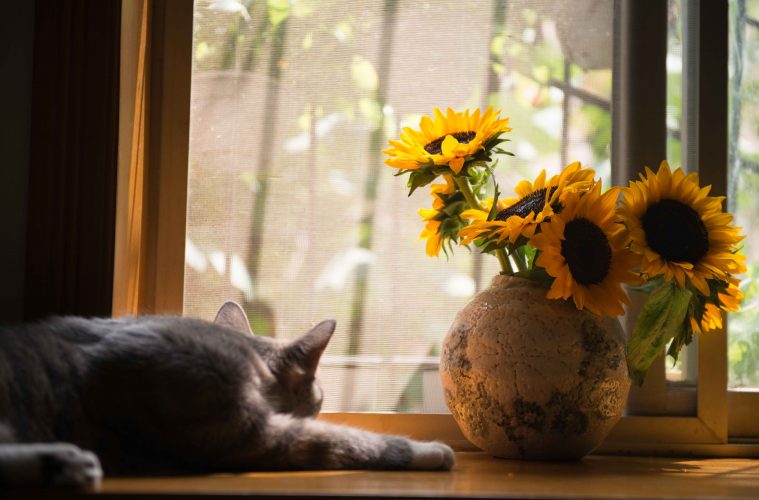There’s so much joy in growing your own sunflowers, whether you’re cutting for the home or leaving them outdoors to shine. Unfortunately, they can also take up a lot of space in the garden. If you’re limited on space to plant, try planting these beauties in containers. These plants aren’t tricky to care for with the right container and the right variety, making them ideal pot plants.
Light
As their name suggests, sunflowers are sun-loving plants that require lots of light. Sunflowers grow best with a minimum of six to eight hours of light each day. Place your sunflowers in an area where they will be exposed to full sunlight every day. Sunflowers are heliotropic, meaning their heads move to follow the sun, so keep them out of shaded areas.
Water
As sunflowers grow, they become more drought tolerant, but this plant does require lots of water due to its large plant mass. Regular waterings encourage growth, and moist soil is good for sunflowers. As soon as you notice the soil starting to dry out, give your sunflowers some water. Even though sunflowers are big drinkers, avoid soggy soil. Soil that is too wet can cause root rot or fungal problems.
Soil
Sunflowers need nutrient-rich soil to keep growing and producing large, bright flowers. A mixture of high-quality compost and potting soil will do wonders for sunflowers. You can also add a few handfuls or perlite to improve drainage or palm peat for better water retention.
Fertilizer
Sunflowers need lots of nutrients to grow, so keeping their soil fertilized is key. In addition to mixing compost in with the potting soil, there are some other fertilizers that will help your sunflowers thrive.
Regularly using a liquid fertilizer that’s high in nitrogen will encourage plant growth early on. Once your sunflowers have bloomed, you can transition to a fertilizer with a high phosphorous content, which will help your plants’ seed development.
Pruning
In general, only perennial sunflower varieties need pruning. In the spring, cut your sunflowers back to about one-half of their size. Prune them back again around the middle of summer by about one-third. Avoid pruning sunflowers after their first flowers bloom, because that can hinder future flower growth.
Mulching
If you live in a particularly dry climate, you can mulch your sunflowers to help them retain moisture. Mulching can also help prevent weed growth. Add a layer of shredded bark, straw, or wood chips to the surface of the soil to mulch your sunflowers.
Support
Some sunflower varieties that grow tall or branch out need support. Rain and high winds can snap sunflower stems and knock them over, so staking your sunflowers is an important preventative measure. Insert stakes alongside your sunflowers, and loosely secure them together. Avoid using sharp materials like metal twist ties, and instead, opt for twine or cloth so your sunflowers don’t get damaged.
Repotting
If your sunflowers end up outgrowing their pots or becoming overcrowded, you can repot them. In a bigger container, add a base layer for drainage and top off with high-quality compost. Gently pull your sunflower plant from its old pot, keeping the root structure intact, and place it in the new container. Fill the space between the container wall and the roots with soil and compost until full. Water your sunflower thoroughly after replanting.
SEE MORE: Potting Tips: How to pot like the pros

